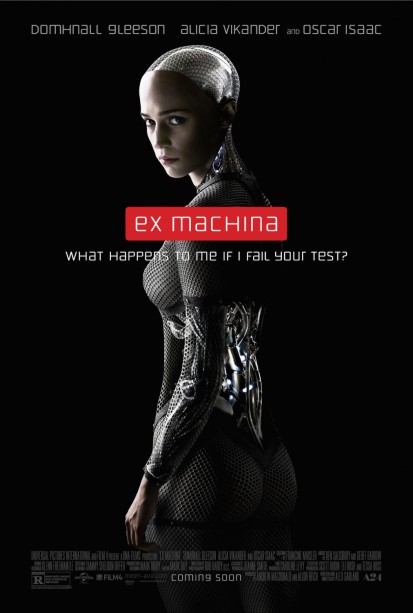Ex Machina (Alex Garland, 2015)
The first film directed by screenwriter Alex Garland (28 Days Later, Never Let Me Go, Dredd), Ex Machina is not nearly as profound as it seems to think it is (despite its high marks on Rotten Tomatoes, but is still (mostly) very watchable and filled with enough strange and unexpected twists to keep the viewer guessing up until the very end. It can never quite figure out what kind of film it wants to be, however, mixing deep thoughts about artificial intelligence (A.I.) with crazy drunken synchronized dancing (which, I will admit, was extremely fun to watch), and although it has fine cinematographic elements that are reminiscent of the best of Stanley Kubrick (slow tracking shots, some done on Steadicam), if one ponders the subject matter for more than a minute or two, it all seems very dumb.
With a pumped-up Oscar Isaac (A Most Violent Year) – always extremely watchable – as Nathan, a software billionaire who has been working to create a fully functioning human-like robot, and an ethereal Alicia Vikander (A Royal Affair) as Ava (that robot), Ex Machina has much to offer in those two marvelous performances. Unfortunately, it also has Domhnall Gleeson (About Time) – an actor who tends to bore me to tears (with the occasional exception) – in the central role as the young protégé whom Isaac invites to his top-secret hideout to run a Turing Test on Vikander. The idea that anyone would take this kid seriously as either a genius programmer or love interest for a fledgling A.I. is hard to swallow. Still, the movie’s final moments are simultaneously chilling and moving, and appeal to the sci-fi geeks in all of us, so I offer a qualified recommendation.
Cinematographer Rob Hardy (The Invisible Woman) and Production Designer Mark Digby (Never Let Me Go) deserve a lot of credit for what works here. Both Ava’s design and the design of Nathan’s remote laboratory/home set the tone – clean, efficient, sterile, yet somehow also organic – that pervades every frame of the film. It’s too bad that so much of the dialogue is expositional. Visually, the movie approaches greatness. Verbally, not so much. Odd, for a movie directed (and written) by a writer.


1 Comment